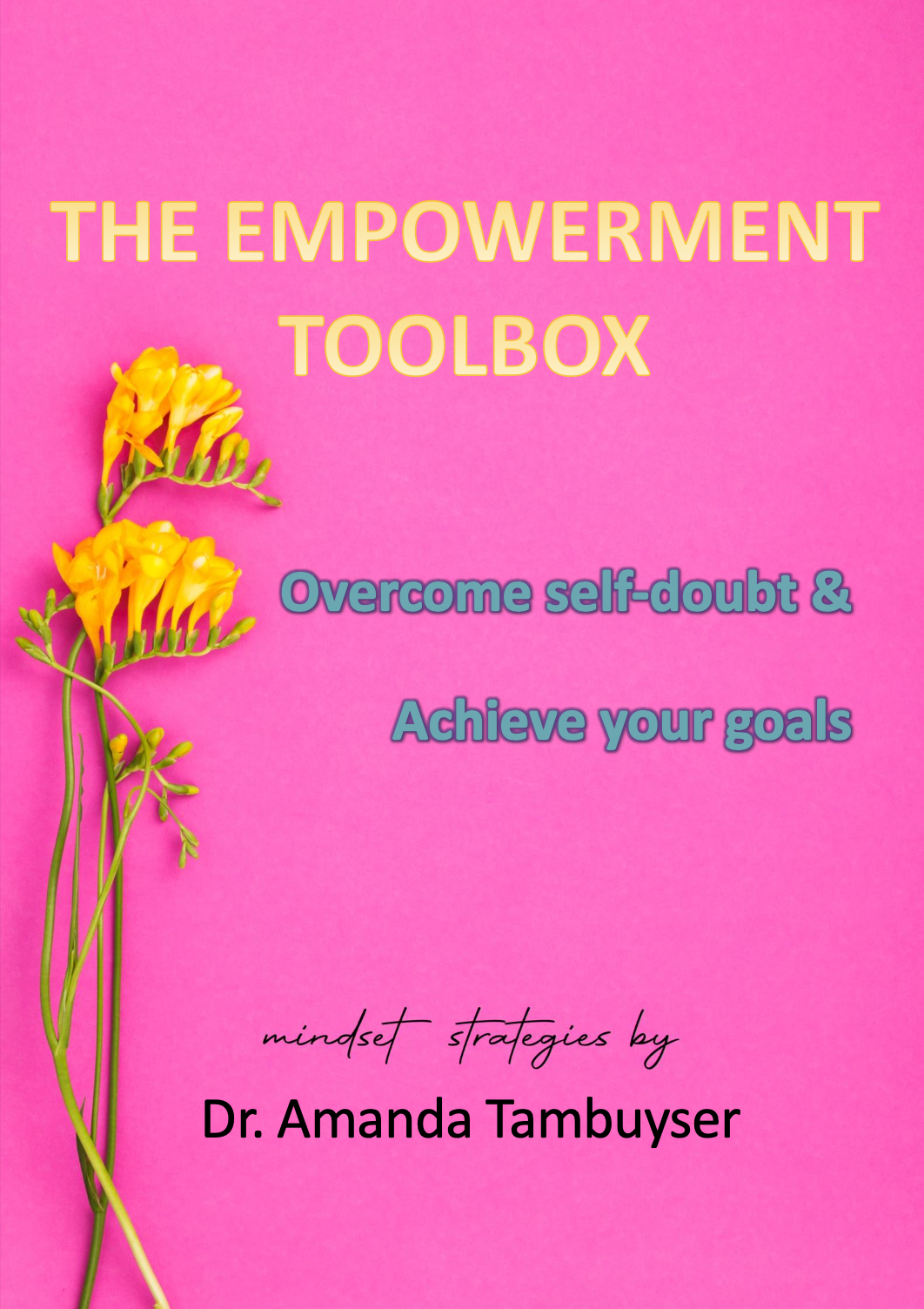FREE RESOURCES
Articles, E-book, Tips & Inspiration
The Secret to Stop Being Overlooked
Overwhelmed and Under Appreciated
Free video mini-course
Start your journey here!

Access Exclusive Content


The Empowerment Toolbox: Overcome Self-Doubt & achieve your goals
Embark on a transformative journey with "The Empowerment Toolbox: Overcome Self-Doubt & Achieve Your Goals," a comprehensive guide by Dr. Amanda Tambuyser designed to reshape your mindset and propel you toward success. This eBook is a treasure trove of mindset hacks and practical tools aimed at individuals seeking personal growth, career advancement, or enhanced well-being.
Key Highlights:
- Unlocking the Power of Mindset: Learn to cultivate the right mindset, a transformative tool that can reshape our reality, overcoming self-doubt and unlocking full potential.
- Core Beliefs and Their Impact: Explore how core beliefs shape our perceptions and responses to the world, and the importance of recalibrating unhealthy core beliefs for a resilient and empowering mindset.
- Practical Mindset Strategies: Dive into actionable strategies for daily integration, including cultivating a growth mindset, practicing self-compassion, and setting realistic goals.
- Harnessing Neuroplasticity: Understand the brain's flexibility and how intentionally moulding our neural pathways can lead to profound changes in thought patterns and behaviours.
Dr. Tambuyser's guide emphasises that overcoming self-doubt is a continuous journey that requires dedication and practice.
By integrating these mindset hacks into your daily life, you can gradually build confidence, silence your inner critic, and embark on a journey of self-discovery and success. A positive mindset is a powerful force that can transform self-doubt into unwavering self-belief, unlocking the potential for personal growth and achievement.
Please Fill Out This Form To Receive Your PDF.

Why Therapy Alone Is Not Enough for Holistic Well-Being
In the contemporary pursuit of mental and emotional well-being, therapy has emerged as a vital tool for personal growth and healing. It offers a structured and professional space for individuals to explore their thoughts and feelings, gain insights into their behaviors, and develop coping mechanisms. However, the assertion that therapy alone is sufficient for achieving holistic well-being warrants a more nuanced examination.
This blog post delves into the limitations of relying solely on therapy and emphasizes the importance of incorporating various complementary practices and lifestyle changes to foster a more enduring sense of wellness.
The Efficacy of Therapy
Therapy, with its diverse approaches and methodologies, has proven successful in addressing specific mental health challenges. Whether through psychoanalysis, cognitive-behavioral therapy, or other modalities, it has become a cornerstone in the treatment of conditions such as depression, anxiety, and trauma.
1. Psychoanalysis: Uncovering the Depths
Psychoanalysis, pioneered by Sigmund Freud, focuses on uncovering unconscious thoughts and emotions. It provides a deep exploration of the psyche, allowing individuals to understand the roots of their behaviors and challenges.
2. Cognitive-Behavioral Therapy: Restructuring Thoughts
Cognitive-Behavioral Therapy (CBT) is a widely practiced approach that emphasizes identifying and challenging negative thought patterns. It equips individuals with practical tools to restructure their thinking and modify behavior.
3. Holistic Approaches in Therapy
Some therapeutic modalities, such as mindfulness-based cognitive therapy or existential therapy, incorporate holistic principles. These approaches acknowledge the interconnectedness of mind, body, and spirit in the pursuit of well-being.
The Limitations of Therapy
While therapy is undeniably effective in many cases, it is essential to recognize its limitations to fully appreciate the broader spectrum of well-being.
1. The Time Constraint:
One significant limitation is the temporal aspect of therapy. Sessions are typically scheduled weekly or bi-weekly, leaving substantial gaps between appointments. While this frequency may be suitable for managing acute issues, it might not be sufficient for those seeking continuous support or navigating complex life transitions.
2. Dependency Concerns:
Relying solely on therapy may inadvertently foster a sense of dependency on the therapist. While a therapeutic relationship is crucial, individuals must develop the capacity to apply the insights gained in therapy to their daily lives independently. Over-reliance on therapy may impede personal agency and hinder the development of self-efficacy.
3. Addressing Root Causes
Therapy often focuses on symptom alleviation rather than delving deep into the root causes of issues. While symptom management is essential, a more holistic approach involves uncovering and addressing the underlying factors contributing to mental health challenges. This may require additional modalities and lifestyle changes beyond the scope of traditional therapy.
4. Individualized Scope:
Therapy, by nature, is tailored to address specific concerns and symptoms presented by the individual. However, this focused approach may inadvertently overlook the broader context of an individual's life, including social, environmental, and cultural factors that significantly contribute to well-being.
5. Limited Duration of Sessions:
The duration of therapy sessions, typically ranging from 45 to 60 minutes, may not allow sufficient time for a comprehensive exploration of complex issues. Individuals may find themselves constrained by time, hindering the depth of understanding and resolution that can be achieved in each session.
6. Lack of Real-time Support:
While therapy provides a structured and supportive environment during scheduled sessions, it lacks the immediacy of real-time assistance. Life's challenges often arise unexpectedly, and the absence of ongoing support between sessions may leave individuals feeling isolated during critical moments.
7. Resistance and Engagement:
The effectiveness of therapy can be influenced by the individual's level of engagement and openness to the therapeutic process. Resistance or reluctance to delve into certain topics may impede progress, highlighting the need for alternative approaches to overcome barriers to communication.
8. Financial Constraints:
Accessing therapy can be limited by financial considerations, as the costs associated with regular sessions, especially with specialized therapists, may pose a barrier for some individuals. This financial constraint can restrict access to the benefits of therapeutic support.
9. Cultural Sensitivity and Diversity:
Therapeutic approaches may not always be culturally sensitive or inclusive. The cultural backgrounds of therapists and individuals seeking therapy can impact the effectiveness of communication and understanding, emphasizing the need for culturally competent practices.
10. Integration with Daily Life:
Applying insights gained in therapy to daily life requires conscious effort and integration. The challenge lies in seamlessly translating therapeutic learnings into practical actions, habits, and coping mechanisms that individuals can readily apply outside the therapeutic setting.
Holistic Approaches to Well-Being
Acknowledging the limitations of therapy opens the door to a more comprehensive approach to well-being that incorporates various complementary practices and lifestyle changes.
1. Mind-Body Connection:
Recent years have seen a growing recognition of the interconnectedness of mental and physical health. Practices such as yoga, meditation, and mindfulness emphasize the mind-body connection, offering holistic approaches to well-being. Engaging in these activities can not only reduce stress but also enhance overall mental clarity and emotional resilience.
2. Nutrition and Well-Being:
The significance of nutrition in mental health cannot be overstated. Research suggests that a balanced diet rich in essential nutrients plays a pivotal role in supporting cognitive function and emotional stability. Exploring the connection between gut health and mental well-being opens up avenues for individuals to make dietary choices that positively impact their mood and overall mental state.
3. Physical Exercise as a Mood Regulator:
Regular physical exercise has long been associated with physical health, but its benefits extend far beyond the physical realm. Exercise releases endorphins, neurotransmitters that act as natural mood lifters, reducing symptoms of anxiety and depression. Incorporating physical activity into one's routine can be a powerful complement to therapeutic interventions.
4. Integrating Holistic Therapies:
Holistic therapies, such as acupuncture, massage, and aromatherapy, provide additional avenues for well-being. These practices aim to balance energy, release tension, and promote relaxation, contributing to an overall sense of peace and harmony.
The Role of Social Support
Building and maintaining meaningful connections with others is integral to well-being. While therapy provides a structured and professional avenue for support, the broader social landscape plays a crucial role.
1. Building Meaningful Connections:
Human beings are inherently social creatures, and the quality of our social connections profoundly influences our well-being. While therapy provides a structured and professional avenue for support, building and maintaining meaningful relationships with friends, family, and community members contribute significantly to emotional resilience.
2. Support Groups and Peer-to-Peer Networks:
In addition to personal relationships, support groups and peer-to-peer networks provide valuable platforms for individuals facing similar challenges to share experiences and coping strategies. These communities foster a sense of belonging and reduce the isolation often associated with mental health struggles.
3. The Power of Empathy:
Empathy, both in giving and receiving, is a potent force in fostering emotional well-being. Cultivating empathy in personal relationships enhances understanding, strengthens connections, and provides a supportive network during challenging times.
Personal Development and Lifelong Learning
Beyond addressing immediate concerns, personal development extends into continuous growth throughout life. Engaging in lifelong learning, acquiring new skills, and setting personal goals contribute to a sense of purpose and fulfillment.
1. Continuous Growth Beyond Therapy:
While therapy may focus on specific issues, personal development extends beyond addressing immediate concerns. Engaging in lifelong learning, acquiring new skills, and setting personal goals contribute to a sense of purpose and fulfillment.
2. Creativity as a Therapeutic Outlet:
Creativity, whether expressed through art, music, writing, or other outlets, serves as a therapeutic channel for self-expression and emotional release. Incorporating creative practices into one's routine can provide an alternative means of processing emotions and fostering a deeper understanding of the self.
3. Setting and Achieving Goals:
The process of setting and achieving goals, both short-term and long-term, is a fundamental aspect of personal development. It provides a sense of direction, accomplishment, and ongoing motivation for self-improvement.
Conclusion
While therapy remains a vital component in the pursuit of mental and emotional well-being, it is crucial to recognize its limitations. A comprehensive approach involves actively seeking complementary practices and lifestyle changes to create a more resilient foundation for navigating life's challenges. From embracing the mind-body connection to nurturing social support networks and fostering continuous personal development, a multi-faceted approach ensures a richer and more fulfilling life journey. As individuals strive for well-being, it is the synergy of therapeutic interventions with diverse modalities that paves the way for a holistic and sustainable sense of wellness.
FAQs
1. Why should I consider more than just therapy for my overall well-being?
While therapy is valuable, its limitations, such as time constraints and a focused scope, may not fully address the complexity of well-being. This blog advocates for a more comprehensive approach that includes complementary practices and lifestyle changes.
2. How do practices like yoga and mindfulness contribute to holistic well-being?
Engaging in activities like yoga, meditation, and mindfulness emphasizes the mind-body connection, reducing stress and enhancing mental clarity. This blog suggests that incorporating such practices complements therapeutic interventions for a more enduring sense of wellness.
3. What role does social support play in mental and emotional well-being, in addition to therapy?
While therapy provides professional support, building meaningful connections with friends, family, and community members is integral to emotional resilience. The FAQ emphasizes the importance of a broader social landscape in the pursuit of a holistic approach to well-being.
